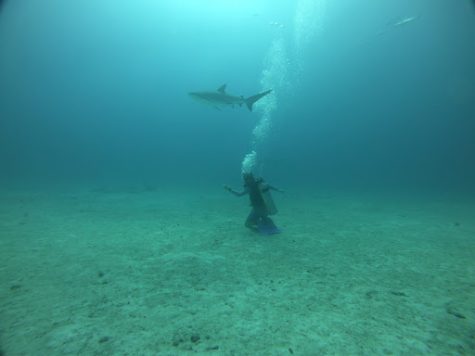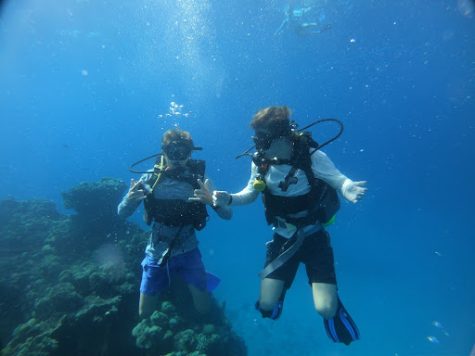Junior Michael Springer survives Bahamas marine biology school

January 23, 2023
High school students typically just complete their regular eight semesters at their school and hope to find out what they want to do with their future along the way. Some don’t even figure their interests out until college, or maybe even after that.
Junior Michael Springer, however, isn’t just a regular high school student. He knew what he wanted to do with his life, and began chasing his dream in his junior year.
Rather than attending LFHS for the first semester, he signed up for a Marine Biology Island school in the Bahamas. Springer said he had an interest in Marine Biology for as long as he can remember.
“As a kid, I loved building dams at local creeks with my mom. Even today, I go fishing with my dad and love every second of it,” said Springer. “A field related to Marine Biology is definitely something I’d love to be part of in the future.”
Growing up loving the outdoors and all things related to nature, Michael was simply poised to love the island school.
While he still took his necessary history, English, and math classes, he also partook in unique courses such as Scuba Diving and Marine Ecology.
He and his classmates spent two days every week scuba diving. They were assigned to dive and observe the different species of sea life, which they would then research in depth later. On some occasions, the islanders were fortunate to encounter all kinds of sharks on their dives, including reef, nurse, and blacktip sharks.
While most people would be alarmed or scared due to the nature of sharks, Springer didn’t flinch.
“It was such a cool experience. Being with those sharks allowed me to be face to face with something so many people fear,” he says.
Michael was assigned a 48-hour solo, where he was dropped off in the middle of an island by himself for two whole days.
Given no food except for two oranges and a bagel (800 calories), Springer had to figure out a way to survive on an extreme fast while having just a tarp and a journal all by himself.
“There really wasn’t much to do. It was really just, get to your spot and survive,” said Michael.
Scorpion traps, clotheslines, and shelters were among the things Springer had to build in order to survive. However, these tasks weren’t easy.
“You weren’t given a watch, so I didn’t have any concept of time, which made things really difficult,” said Springer. “At times I could make an approximation based on the sun, but I would have no idea when I’d be going to sleep or waking up.”
He was isolated for two days in the wilderness with only his survival skills.
Nonetheless, he loved the experience.
Even afterward, when he got picked up with all his other friends, who also had their own solos, he shared an unforgettable moment as he reconnected with his peers.
“When everyone got picked up from their spots, I just remember we all looked at each other and started laughing. It was quite an experience. Everyone looked very different as if they’d been in a dump for two days,” Springer recalled.
In a completely new school on a whole new continent, with kids from around the world, Michael made some very strong connections and relationships with the people he met. His new friends remain in close touch whether they’re in Europe or Africa or close by, they are all still in touch.
 “It was super challenging at first, but within a month or so everyone had just gotten so close that it felt like we’d known each other our whole lives. I built some strong bonds with these people,” said Springer.
“It was super challenging at first, but within a month or so everyone had just gotten so close that it felt like we’d known each other our whole lives. I built some strong bonds with these people,” said Springer.
High school students don’t get to experience all the fascinating things Michael did. In Lake Forest or any typical school, it’s pretty safe to say you’re not able to go kayaking or swim with sharks, let alone have your survival skills tested in the middle of an island.
“Most kids don’t ever get the chance to experience anything like this,” said Michael. “The whole thing felt so new like I was living in a completely new world.”







Sean • Apr 7, 2023 at 1:30 pm
Im so glad that he is safe, I love him.